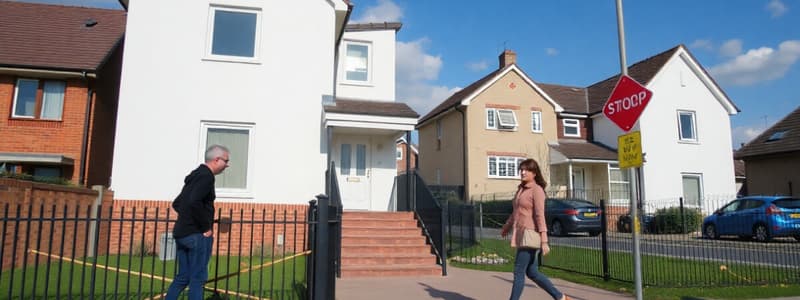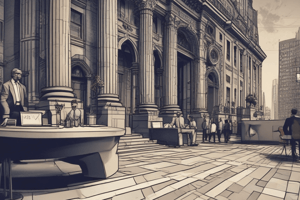Podcast
Questions and Answers
Which Act governs the duties of occupiers towards visitors?
Which Act governs the duties of occupiers towards visitors?
- Occupiers’ Liability Act 1984
- Negligence Act
- Occupiers’ Liability Act 1957 (correct)
- Occupiers’ Responsibilities Act
The Occupiers’ Liability Act 1984 applies only to trespassers.
The Occupiers’ Liability Act 1984 applies only to trespassers.
True (A)
What is one element a visitor must prove to establish a claim under the 1957 Act?
What is one element a visitor must prove to establish a claim under the 1957 Act?
The occupier breached their duty of care.
The primary requirement for establishing liability under the 1957 Act involves proving a breach of __________.
The primary requirement for establishing liability under the 1957 Act involves proving a breach of __________.
Match the type of claimant with the applicable Act:
Match the type of claimant with the applicable Act:
Which of the following scenarios is covered under the 1957 Act?
Which of the following scenarios is covered under the 1957 Act?
Both the 1957 and 1984 Acts cover dangers arising from the state of the premises.
Both the 1957 and 1984 Acts cover dangers arising from the state of the premises.
What common factor do both Acts address regarding occupier liability?
What common factor do both Acts address regarding occupier liability?
What status does a hotel guest acquire when they enter a forbidden part of the premises?
What status does a hotel guest acquire when they enter a forbidden part of the premises?
A police officer with a valid search warrant is considered a trespasser under the 1957 Act.
A police officer with a valid search warrant is considered a trespasser under the 1957 Act.
What is the common duty of care owed by an occupier to visitors?
What is the common duty of care owed by an occupier to visitors?
The definition of 'premises' under the 1957 Act includes open land as well as fixed or moveable __________.
The definition of 'premises' under the 1957 Act includes open land as well as fixed or moveable __________.
Match the following terms to their definitions:
Match the following terms to their definitions:
Under which act would loss or injury claims be made when a status changes from visitor to trespasser?
Under which act would loss or injury claims be made when a status changes from visitor to trespasser?
The duty of care owed to visitors is different depending on the type of visitor.
The duty of care owed to visitors is different depending on the type of visitor.
What is the main consideration for the duty of care that occupiers owe to visitors?
What is the main consideration for the duty of care that occupiers owe to visitors?
What does contributory negligence imply in the context of visitor injuries?
What does contributory negligence imply in the context of visitor injuries?
A trespasser has express permission to be on the occupier's premises.
A trespasser has express permission to be on the occupier's premises.
What defines a trespasser according to Lord Dunedin?
What defines a trespasser according to Lord Dunedin?
The 1984 Act imposes a duty of care on __________ to individuals who do not have permission to be on the premises.
The 1984 Act imposes a duty of care on __________ to individuals who do not have permission to be on the premises.
Match the following terms with their correct definitions:
Match the following terms with their correct definitions:
What can cause a visitor to become a trespasser?
What can cause a visitor to become a trespasser?
Under the 1957 Act, occupiers owe a common duty of care to trespassers.
Under the 1957 Act, occupiers owe a common duty of care to trespassers.
What happens to damages for visitors who are partly responsible for their own injuries?
What happens to damages for visitors who are partly responsible for their own injuries?
What do both the 1957 Act and 1984 Act primarily cover regarding occupier liability?
What do both the 1957 Act and 1984 Act primarily cover regarding occupier liability?
The 1984 Act governs the duties of occupiers solely towards visitors.
The 1984 Act governs the duties of occupiers solely towards visitors.
What must a visitor prove under the 1957 Act to establish a claim?
What must a visitor prove under the 1957 Act to establish a claim?
The _______ Act provides regulations for claims made by trespassers.
The _______ Act provides regulations for claims made by trespassers.
Match the following scenarios to the correct Acts:
Match the following scenarios to the correct Acts:
Which of the following situations would likely not be covered by the 1957 Act?
Which of the following situations would likely not be covered by the 1957 Act?
An occupier’s liability under the 1957 Act does not extend to risks that the visitor knew about.
An occupier’s liability under the 1957 Act does not extend to risks that the visitor knew about.
What is the primary duty of care owed by an occupier to a visitor?
What is the primary duty of care owed by an occupier to a visitor?
What can be a reason for a visitor to become a trespasser?
What can be a reason for a visitor to become a trespasser?
A trespasser has the occupier's permission to be on the premises.
A trespasser has the occupier's permission to be on the premises.
What reduces damages for visitors who are partly responsible for their own injuries?
What reduces damages for visitors who are partly responsible for their own injuries?
The law governing the duties of occupiers regarding trespassers is found in the __________ Act.
The law governing the duties of occupiers regarding trespassers is found in the __________ Act.
In which of the following scenarios would an individual be considered a trespasser?
In which of the following scenarios would an individual be considered a trespasser?
Under the 1957 Act, the common duty of care is owed to both visitors and trespassers.
Under the 1957 Act, the common duty of care is owed to both visitors and trespassers.
Who is responsible for establishing whether an individual is a trespasser?
Who is responsible for establishing whether an individual is a trespasser?
Which of the following best describes the common duty of care owed by an occupier to visitors under the 1957 Act?
Which of the following best describes the common duty of care owed by an occupier to visitors under the 1957 Act?
A visitor becomes a trespasser if they exceed the permission granted to them by the occupier.
A visitor becomes a trespasser if they exceed the permission granted to them by the occupier.
What must a visitor prove to establish a claim under the 1984 Act after becoming a trespasser?
What must a visitor prove to establish a claim under the 1984 Act after becoming a trespasser?
The definition of 'premises' in the 1957 Act includes fixed or moveable structures, as well as __________.
The definition of 'premises' in the 1957 Act includes fixed or moveable structures, as well as __________.
In which scenario would an occupier be liable under the 1957 Act?
In which scenario would an occupier be liable under the 1957 Act?
Match the following statuses with their definitions:
Match the following statuses with their definitions:
For a visitor, the duty owed by an occupier changes depending on the type of visitor.
For a visitor, the duty owed by an occupier changes depending on the type of visitor.
What is a scenario that would likely change a visitor into a trespasser?
What is a scenario that would likely change a visitor into a trespasser?
Flashcards
What is the Occupiers' Liability Act 1957?
What is the Occupiers' Liability Act 1957?
The Occupiers' Liability Act 1957 sets out the duties owed by an occupier to visitors on their premises. This duty includes the obligation to ensure the premises are safe for visitors and to warn them of any potential dangers. A 'visitor' can be someone invited or someone who has implied permission to be there. The Occupiers' Liability Act 1957 doesn't cover activities carried out on the premises.
What is the Occupiers' Liability Act 1984?
What is the Occupiers' Liability Act 1984?
The Occupiers' Liability Act 1984 covers the duties owed by an occupier to trespassers. These duties are less extensive than those owed to visitors - the occupier only needs to take reasonable steps to protect trespassers from dangers that they are unaware of. 'Trespassers' are people who enter premises without permission.
What does 'dangers due to the state of the premises' mean?
What does 'dangers due to the state of the premises' mean?
The Occupiers' Liability Acts 1957 and 1984 cover 'dangers due to the state of the premises' and 'things done or omitted to be done on the premises'. This means that activities carried out on the premises, rather than the condition of the premises, are not covered. For example, if a visitor is injured by a vehicle while on the occupier's premises, it would not be covered by the Occupiers' Liability Act.
Why are the Occupiers' Liability Acts considered a 'special liability' regime?
Why are the Occupiers' Liability Acts considered a 'special liability' regime?
Signup and view all the flashcards
How do Occupiers' Liability Acts fit within the negligence framework?
How do Occupiers' Liability Acts fit within the negligence framework?
Signup and view all the flashcards
How can the Occupiers' Liability Acts be applied to real-world incidents?
How can the Occupiers' Liability Acts be applied to real-world incidents?
Signup and view all the flashcards
Trespasser (exceeding permission)
Trespasser (exceeding permission)
Signup and view all the flashcards
Visitor (under law)
Visitor (under law)
Signup and view all the flashcards
Trespasser (no permission)
Trespasser (no permission)
Signup and view all the flashcards
Common Duty of Care (Occupiers' Liability Act 1957)
Common Duty of Care (Occupiers' Liability Act 1957)
Signup and view all the flashcards
Visitor's safety is paramount
Visitor's safety is paramount
Signup and view all the flashcards
Reasonable care (common duty)
Reasonable care (common duty)
Signup and view all the flashcards
Definition of 'premises' (1957 Act)
Definition of 'premises' (1957 Act)
Signup and view all the flashcards
Breaching the common duty of care
Breaching the common duty of care
Signup and view all the flashcards
What is a trespasser?
What is a trespasser?
Signup and view all the flashcards
What is the duty owed to trespassers compared to visitors?
What is the duty owed to trespassers compared to visitors?
Signup and view all the flashcards
Can a visitor become a trespasser?
Can a visitor become a trespasser?
Signup and view all the flashcards
What is contributory negligence?
What is contributory negligence?
Signup and view all the flashcards
What is the difference between a visitor and a trespasser?
What is the difference between a visitor and a trespasser?
Signup and view all the flashcards
What is the duty of care owed to visitors?
What is the duty of care owed to visitors?
Signup and view all the flashcards
What is the duty of care owed to trespassers?
What is the duty of care owed to trespassers?
Signup and view all the flashcards
What is an 'occupier'? What are 'premises'?
What is an 'occupier'? What are 'premises'?
Signup and view all the flashcards
Trespasser by exceeding permission
Trespasser by exceeding permission
Signup and view all the flashcards
Visitor under legal authority
Visitor under legal authority
Signup and view all the flashcards
Common Duty of Care
Common Duty of Care
Signup and view all the flashcards
Reasonable care under the circumstances
Reasonable care under the circumstances
Signup and view all the flashcards
What are "premises"?
What are "premises"?
Signup and view all the flashcards
Breach of the common duty of care
Breach of the common duty of care
Signup and view all the flashcards
Who is the "occupier"?
Who is the "occupier"?
Signup and view all the flashcards
Who is a "trespasser"?
Who is a "trespasser"?
Signup and view all the flashcards
Occupiers' Liability Act 1957
Occupiers' Liability Act 1957
Signup and view all the flashcards
Occupiers' Liability Act 1984
Occupiers' Liability Act 1984
Signup and view all the flashcards
Dangers due to the state of the premises
Dangers due to the state of the premises
Signup and view all the flashcards
Visitor
Visitor
Signup and view all the flashcards
Trespasser
Trespasser
Signup and view all the flashcards
Contributory Negligence
Contributory Negligence
Signup and view all the flashcards
Duty to Trespassers
Duty to Trespassers
Signup and view all the flashcards
Visitor to Trespasser
Visitor to Trespasser
Signup and view all the flashcards
Study Notes
Occupiers' Liability
- Occupiers' liability is a special liability regime combining statutory and common law negligence.
- The Occupiers' Liability Act 1957 (1957 Act) governs occupiers' duties to visitors.
- The Occupiers' Liability Act 1984 (1984 Act) governs occupiers' duties to others, mostly trespassers.
- Both acts apply to "dangers due to the state of the premises".
- Examples differentiate claims under these acts from negligence claims.
- Visitors are those with express or implied permission.
- The 1957 act covers dangers due to the state of the premises and dangers arising from acts done or omitted.
- The 1957 act does not cover activities unrelated to the state of the premises.
Examples and Liability
- A visitor falling through a broken floorboard in a house is covered by the 1957 Act.
- A visitor slipping on oil in a garage is covered by the 1957 Act.
- A visitor struck by a car reversing from a garage is not covered by the 1957 Act.
- A visitor going behind a till to steal is not covered. (A trespasser act)
Liability to Visitors
- To claim occupier's liability, a visitor must prove loss due to the premises' state, identify the occupier, demonstrate their visitor status, and prove the occupier's failure to ensure visitor safety.
- An occupier is someone with sufficient control over premises.
Who is an Occupier?
- Control, not ownership, is the key characteristic of an occupier.
- Individuals, not just owners, can be occupiers.
- Multiple occupiers can exist for specific premises parts. (e.g., managers of a public house and owners)
Who is a Visitor?
- Visitors are those with express or implied permission to be on the premises.
- Guests are lawful visitors.
- Sales representatives are visitors typically unless revoked
- Hotel guests, staff-only areas, and individuals exceeding express permission are not visitors.
- Police entering with a warrant are visitors.
- An entrant initially a visitor can become a trespasser (if limits are exceeded, or doing something outside the scope of the permission)
- People accessing land through an access agreement are visitors
- People accessing land under countryside and rights of way act are visitors (but the duty owed may be limited)
- People exercising private rights of way are visitors
- Someone entering for non-business purposes is a visitor
- People using a public road are not considered visitors
Occupiers' Duty of Care
- The duty is to take reasonable care to ensure visitor safety in all circumstances.
- This duty extends to protecting visitors from risk of harm due to the state of the premises.
Breach of Common Duty of Care
- Occupier breaches this duty if they fall below reasonable standards.
- Elements considered include nature of danger, visitor purpose, risk severity, cost/practicality of precautions, etc.
Occupiers' Liability and Children
- Occupiers are responsible for providing a higher degree of care for child visitors.
- Occupiers must consider child's lack of awareness and care precautions.
- Allurements to children need specific precautions
Occupiers' Liability and Skilled Visitors
- Occupiers can reasonably expect skilled visitors to appreciate normal risks inherent to their skills
- This may lower the standard of care expected from the occupier regarding skilled visitors
Occupier's Liability and Warning
- Warnings may not automatically absolve Occupier from liability.
- Warnings must be adequate and specific to the danger.
- Age and comprehension of the visitor is considered in the adequacy of warnings.
- Warnings must clearly explain the hidden dangers.
- Warnings must be clearly understandable and/or perceivable by the target audience
- It is necessary to ensure that the warning would make a visitor reasonably safe.
Occupiers' Liability and Independent Contractors
- Occupiers can delegate tasks to independent contractors.
- Occupiers have a duty to ensure reasonable care in choosing and overseeing contractors.
- If injury occurs due to a contractor's fault and the occupier acted reasonably in choosing and supervising, then the occupier may not be held liable.
Occupiers' Liability to Trespassers
- The 1984 Act governs occupiers' duties to trespassers.
- Conditions for breach include awareness of danger, trespasser proximity to danger, and a reasonable expectation of offering some protection.
- Trespasser is anyone lacking explicit/implicit permission to use the premises.
- If the danger was a natural and obvious condition, the occupier's duty may not apply.
Occupiers' Liability and Defences
- Voluntary assumption of risk/volenti non fit injuria is a defence available in both acts.
- Contributory negligence (partial defence).
- Illegality is not a defence for trespassers (Except in certain circumstance).
Occupiers' Liability and Exclusion
- Occupiers can exclude liability; it must be in reasonable circumstances, well publicized to the visitor, and applicable to the resulting claim.
- Statutory interpretation and court precedence affect these clauses.
- Exclusion clauses are subjected to the unfair contract terms act 1977 (UCTA) and the consumer rights act 2015 (CRA).
Studying That Suits You
Use AI to generate personalized quizzes and flashcards to suit your learning preferences.




